One of the littlest words in the English language gives the biggest clue about where Donald Trump’s head is at: his use of the word ”the.”
In the second US presidential debate on Oct. 9, Trump promised, “I’m going to help the African-Americans. I’m going to help the Latinos, Hispanics. I am going to help the inner cities. [Clinton has] done a terrible job for the African-Americans.” Trump’s unusual use of “the” hasn’t gone unnoticed.
Normally innocuous, this definite article is now causing serious offense. The hashtag #theAfricanAmericans has been trending since the debate with angry and sardonic comments on Trump’s linguistic choice.
If Trump had said, “I’m going to help African-Americans,” we’d assume he meant African-Americans in general—whichever ones need help. Under normal circumstances, saying “the African-Americans” would raise the question: Which African-Americans? In the context of the debate, we have to assume he intends to refer to all African-Americans, and so “the” seems unnecessary. But it is doing something. It takes that plural, “African-Americans,” and makes the group into more of an undifferentiated whole.
For example, if we say “African-Americans work in the auto industry,” we’re not saying that all African-Americans do one kind of work. In this case, putting “the” before “African-Americans” makes it sound like all African-American people work in one industry: “The African-Americans work in the auto industry.”
“The” makes the group seem like it’s a large, uniform mass, rather than a diverse group of individuals. This is the key to “othering:” treating people from another group as less human than one’s own group. The Nazis did it when they talked about die Juden (“the Jews”). Homophobes do it when they talk about “the gays.” In my research on British and American cultural relations, I’ve found that British writers’ views on American English are a good predictor of whether they’ll write “Americans say it that way” or “The Americans say it that way.” Those who feel that American English threatens British English use “the” to hold Americans at arm’s length (possibly while holding their noses).
Neither candidate refers to the general American public as “the Americans”—to do so would be deeply weird, since it would seem like they did not include themselves in the group. (Trump does have a penchant for talking about “the people of this country” and how they are furious, but if he had said “the Americans are furious,” we’d know for sure we had a Manchurian candidate.)
But both candidates sometimes say “the” before the names of nationalities and ethnicities. The difference is that when Clinton talks about the Russians, the Syrians, the Iranians, and the Kurds, she’s talking about governments or military groups, not everyone of that particular nationality. Trump’s use of the African-Americans and the Latinos feels different.
I doubt it’s an accident that Trump talks about ethnic groups in the same way that we talk about foreign governments and armies. If that “the” treats ethnic groups as some monolithic cabal, that might ring true with the conspiracy-theory mind-set that characterizes some of his core audience—the audience that Trump has been priming to see and make trouble at polling places “in certain areas”.
Trump’s “the” works as a dog-whistle to disaffected rural white voters attracted to his message. At the very least, he is demonstrating to those voters that he is keeping other groups distanced—that, like them, he sees African-Americans and Latinos as something over there, in the inner cities (and the White House), rather than as millions of individual Americans with as much invested in the future of this country as its white citizens.
